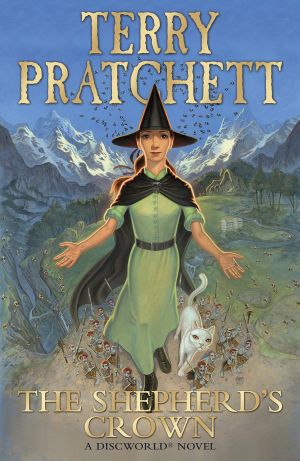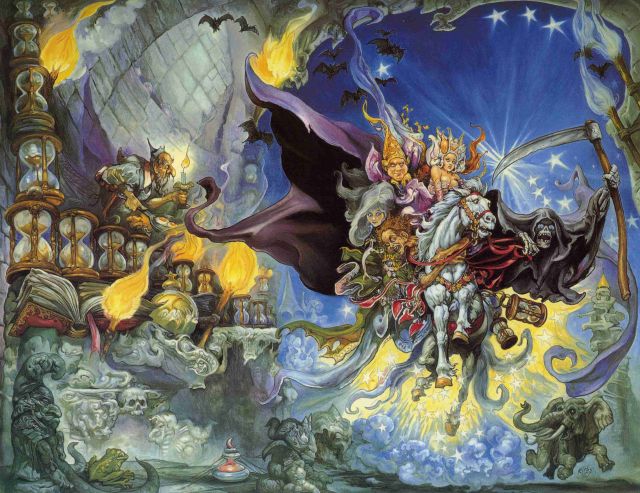
[Spoiler: this post contains spoilers. Stop reading now if you don't like spoilers.]
Death is a mystery, in no small part thanks to popular media. It's frequently portrayed as an aberration, a cheap shock, a thing that either supplies or removes motivation. Rarely do we see what precedes that cessation of life, the thoughts that arrive on the precipice of dying, or how people put themselves back together after the loss of a loved one. Appropriately, if somewhat heartrendingly, Terry Pratchett's final book, The Shepherd's Crown, touches quietly on those matters.
It opens with a death. In Chapter Two, Mistress Esmerelda Weatherwax, the de facto leader of the witches in Discworld, passes on with nary a fuss. She tidies her domicile, puts aside funerary accoutrements for the convenience of those who will survive her, dispenses a goodbye pat to her cat You, and then lays down for the final time. Death eventually arrives like an old friend: unwanted, inconvenient, but not begrudged.
He asks her: “WHY WERE YOU CONTENT TO LIVE IN THIS TINY LITTLE COUNTRY WHEN, AS YOU KNOW, YOU COULD HAVE BEEN ANYTHING AND ANYBODY IN THIS WORLD.”
To this, Weatherwax replied: “I never wanted the world -- just a part of it, a small part that I could keep safe, that I could keep away from the storms. Not the ones of the sky, you understand: there are other kinds.”
Something in me broke when I read that excerpt. Terry Pratchett is ostensibly a voice of humorous fantasy. He made atheist golems, literary orangutans, a cowardly wizard who dealt with his role as a Hero by running away very, very quickly. But as Neil Gaiman observed in his introduction for A Slip of the Keyboard: Collected Non-fiction, Discworld’s venerable creator was also often furious.
His books snarled. They railed against today’s storms, its innumerous injustices. Monstrous Regiment lampooned the pointlessness of war. Equal Rites shouted at sexism, Small Gods at the problem of blind faith, Carpe Jugulum the privileged’s proclivity to demean those beneath them. In comparison, The Shepherd’s Crown feels quieter and tauter, although no less fierce. It feels like an acknowledgement. No matter Pratchett’s influence, there is only so much he could do, has done, can continue to do even as the effects of his writing ripple outwards. And he seems at peace with that. As Death muses to Granny Weatherwax, nobody can do better than to leave the world better than they’ve found it.

Pratchett reminds us of this, again and again, as the book progresses: that life is meant to be lived. When the young Tiffany Aching, Weatherwax’s successor, worries about the logistics of burial, Nanny Ogg declares that witches do not mourn for long, that they are satisfied with happy memories because “they’re there to be cherished.”
We are told too that all life matters, regardless of the ostensible importance of its owner. Weatherwax might have been a name that all of the Discworld recognized, but Tiffany’s grandmother, a shepherdess without eldritch power, was no less significant:
No shepherd ever passed without a glance at the skies and a thought for Granny Aching, who had tramped those hills night after night, her light zigzagging in the darkness. Her nod of approval had meant the world on the Chalk.
Other themes are also explored in the last Discworld book: the effects of toxic masculinity for one, and the necessity for kindness for another. Nothing can change without the willingness to allow change. It’s a final lesson that rings especially true these days as opposing ideologies clash over everything from gaming to basic human rights. If we’re not prepared to listen, how can we expect reciprocal treatment?
The Shepherd’s Crown is a short book. Clipped, in some ways, and comparatively bereft of Pratchett’s usual armament of jokes. It speeds too quickly towards its climactic showdown between our heroes and the invading elves, because, as Pratchett’s assistant Rob Wilkins explains, the book “was, still, not quite as finished as he would have liked it when [Pratchett] died.”
Nonetheless, that doesn’t make it any less beautiful, or any less potent as a self-eulogy. For years, Terry Pratchett told people what he thought about the world through his books. Now, for the last time, he is speaking to us again. About death. About dignity. About holding on. About not trying to be someone else but using their example to be the best us we can achieve. About being kind to your enemies, but not unthinkingly so. About acceptance.
About life.
Those looking for the razor-slick wit that defined Pratchett’s earlier works might be disappointed, but The Shepherd’s Crown, full of heart and hope, is a fitting goodbye for one of the genre’s most influential—and shoplifted—writers.
reader comments
64